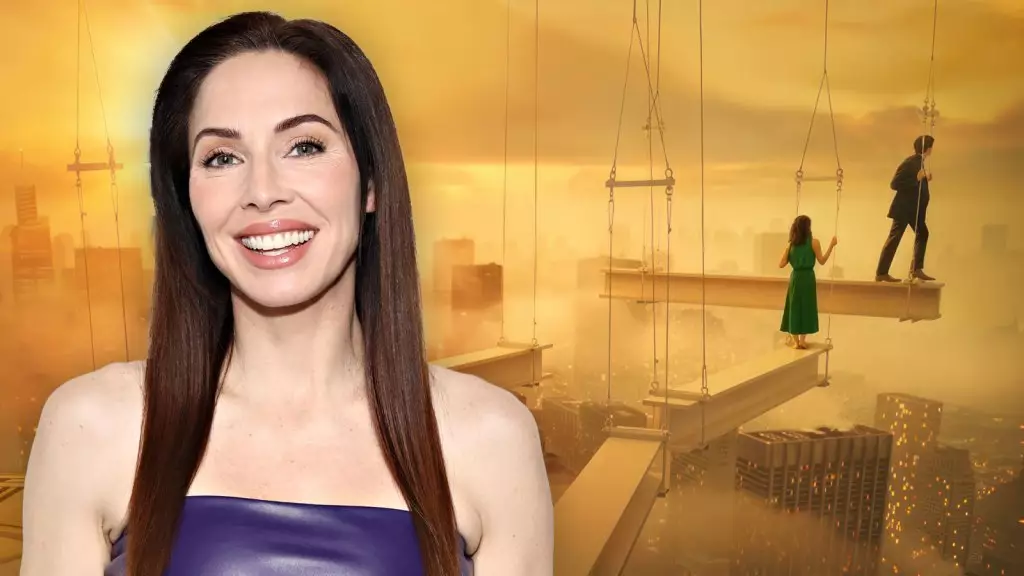Whitney Cummings, a prominent figure in the comedy world, recently shared recollections of a profoundly unsettling audition she experienced for Francis Ford Coppola’s ambitious project, *Megalopolis*. This incident, which she described as “horrific” during a candid discussion on the *Good For You* podcast, offers a glimpse into the often-overlooked struggles faced by comedians and actors alike. Cummings articulated not just her feelings of humiliation but also a broader commentary on the unpredictable nature of the audition process in Hollywood.
Cummings dedicated herself thoroughly to the preparation of her audition, devoting several days to memorize her lines. However, upon arriving at the audition, she sensed an unsettling atmosphere. “The whole room felt off; it lacked any of the usual energy associated with auditions. Nobody was engaging or offering pleasantries,” she recounted. This observation highlights the immense pressure that performers can feel in daunting environments, particularly when facing influential figures like Coppola.
Unlike traditional auditions where actors often perform scripted scenes, Coppola’s vision required a different approach. Cummings was prompted to improvise scenes, a task that can be both exhilarating and terrifying. She reminisced about the bizarre directions Coppola assigned to her, including bidding farewell to a son departing for war, all while utilizing an English accent. To make matters more complex, she faced another demand of confronting her “husband” with an Australian accent.
This absurdity led Cummings to question the authenticity of the scenario, jokingly speculating that she might have been the target of a prank akin to her previous experience on *Punk’d*. “If this is a setup, it’s genuinely brilliant,” she mused. Yet, the looming anxiety of performing in such a far-from-normal situation began to overwhelm her, causing her to “glaze over” as she struggled to maintain her composure. The notion of disassociating during a performance speaks to a fragile state of mind many artists encounter when faced with daunting expectations, particularly under the scrutiny of filmmaking legends.
What followed this interrogation of her talent and adaptability was a feeling of profound embarrassment. Cummings expressed her discomfort when Coppola, after seemingly perplexing her with his direction, brushed aside the seriousness of their interaction. “He handed me a signed copy of his new book, treating it as if I was attending an autograph signing,” she reflected. This moment encapsulates the often bizarre intersection of fame and vulnerability in the entertainment industry. Cummings’ experience is more than a simple story of an uncomfortable audition; it is a striking examination of the dissonance between an actor’s aspirations and the harsh realities of the industry.
As a member of the comedic elite, Cummings recognizes that moments like these can contribute to the richness of her comedic persona. They become the anecdotes that shape a comedian’s narrative and connect them to their audience. A detrimental audition, while deeply humiliating in the moment, ultimately adds nuance to her journey.
Despite Cummings’ turmoil, *Megalopolis* emerged with a notable box office presence, grossing over $13 million against a lofty budget of approximately $120 million. The film boasted an impressive cast, including notables like Adam Driver and Laurence Fishburne, distinguishing it even further as a significant project in the cinematic landscape. However, the stark contrast between the film’s ambitious budget and its box office performance underlines the unpredictability of the industry, further emphasizing the pressure on performers to deliver excellence.
Whitney Cummings’ tale of her audition serves as a poignant reminder of the complexities inherent in pursuing a career in entertainment. It reveals how even seasoned performers can feel vulnerable and bewildered in the face of legendary directors and unconventional requests. Her reflections resonate not only within the realm of comedy but offer insight into the universal challenges faced by those in the performing arts, exemplifying how every experience—painful or otherwise—shapes the artist’s growth.

